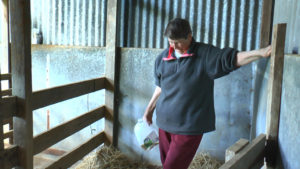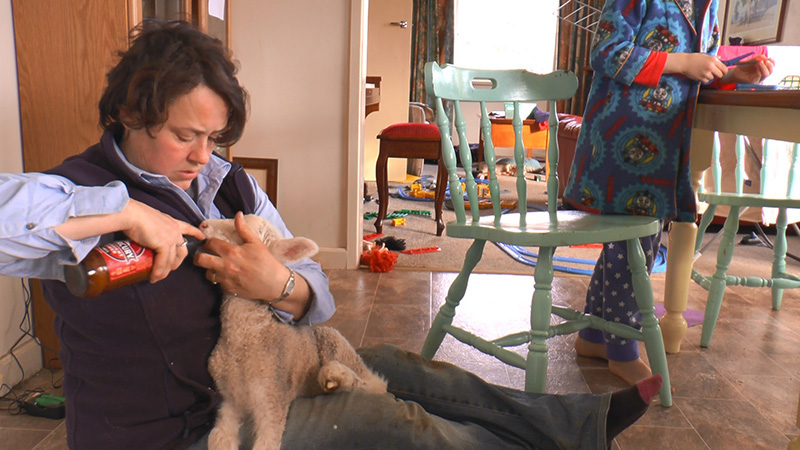
The small, but perfect, existence of tending family and flock
Amber Rhodes has her hands full with a farm and four kids, and she wouldn’t want it any other way. David Ross reports. Photos and video by Lewis Fischer.
Clouds of steam rising from Yallourn power plant are drifting over the trees and hills. Amber Rhodes is riding her quad bike across the paddocks back to the house, hauling behind her the first dead sheep of the day.
She has its orphaned lamb on her lap. It’s peak time in the lambing season and her husband Lindsay is away shearing in NSW for six weeks, so she’s single-handedly tending the family, the flock, and the 70 hectares they farm.
“There are live stock and there are dead stock and that’s a part of farming,” she says over a cup of tea. “You have a responsibility to all your animals and so you do what you can to keep them alive.”

Amber’s neighbour Jean helps o“You have a responsibility to all your animals and so you do what you can to keep them alive.”
As Amber sits at the kitchen table, she feeds a bottle to the thirsty rescued lamb on her lap. It’s not quite a moment to herself, but about the closest she is likely to get.
“You’re not Amber anymore, you’re mum, you’re the missus – I get called ‘darl’ – so who is this Amber?” she says. “You can lose your sense of identity a bit.”
She works hard to keep a sense of herself as a whole, and not “just” a farmer, or “just” a mother of four, for all the relentlessness of both those jobs. A 15-year veteran of classical singing and choir teacher, Amber loves to sing and play piano. She even had the old dairy converted into the a make-do music studio where about a dozen of her neighbours and friends get together for Monday night choir practice, belting out the likes of A Million Dreams and The Sounds of Silence .
“To me my whole existence is what my neighbours are doing, what the football club, my singing students, and now the choir and family,” she says. “It’s like it becomes smaller, your whole existence, but it’s perfect, you don’t need anything else.”
One of her children Austen, 8, is slamming out Rudolph the Red-Nosed Reindeer on the piano in the living room, while Jesse, 7, is arranging a racetrack across the living room floor.
With the immediate needs of both the orphan and her boys taken care of, Amber loads her youngest, five-year-old Imogen, into the ute, and they head out to check all the paddocks before lunch to make sure nothing’s gone awry.
As the mud-flecked ute crests the hilltop that overlooks the farmhouse, Amber is worrying out loud that the sheep have escaped. And they have.
Why would an animal that’s fed and cared for want to escape? “The grass is always greener on the other side, that sort of thing,” she laughs.
“There’s always something going on,” she says, crunching the gears through a three-point turn. “We’ll have to go back and get the dog.”
She tears down the hill, quickly unchaining Pip the brown kelpie who hops on the tray. “My absolute saving grace while my husband has been away is our working dog.”
Pip and Amber get to work and without too much effort the sheep are put back, many trying to escape under the fence, one of them managing to get lodged in the wire.“We’re going to do this the unconventional way,” Amber says.

Amber bottle-feeds a lamb
She leans her slight frame in, flips the sheep on its back and drags it down the road and through the gate. “There’s some action for you!”
Imogen watches it all intently from the roadside. She really wants to help and is running around in excitement. Growing up in the country is an education in its own right. For a while, Amber was also homeschooling the kids, in part because the 40-minute drive to school got all too much. But now they go to various schools in the towns across the valley, with the local school bus picking the kids up from the corner.
On the way back down to drop the dog off, Amber spots a very sick ewe, its tiny lamb lying in the paddock bleating.
“That is the biggest udder, it’s almost hanging down to the ground!” she tells her husband over the phone, sitting in the paddock trying to figure out what to do with the ewe.
“So much drama, honestly,” she says. “If it’s not one thing it’s something else.”
Soon she is back up at the top paddock, having turned off the electric fence that keeps in the stock. The farm is steep hill country, which made it cheaper land to buy, but harder to access and manage. It was the best she and Lindsay could afford when they set out on their own a year ago, having previously farmed on his parents’ property outside Trafalgar.
Erosion is a problem here, a whole slope of one paddock is off-limits to sheep because the land is unstable, having been attacked by burrowing insects.
Amber manages to bait the sick ewe across to the truck, before bringing her back down to the farm house, and another round of juggling livestock, household and family.
When it all gets too much, there are the neighbours, and before the day is up she will be calling for reinforcements.
“Out here, neighbours are invaluable,” she says. “It’s not like in the city where you all ignore each other and live in your own little box.”
She needs someone who can milk a sheep, to relieve that ewe with mastitis. Luckily, neighbour Jean is a champion milker, and has indeed won an award for it, albeit some 30 years back.
Jean’s spent half her life in Budgeree, the town next door to YInnar. She spent another 30 years before that at her parents’ farm nearby, in a house with no hot water or electricity, where early each morning she’d get up and milk the cows by hand.
If it’s possible for someone to be an institution, Jean seems to be it. She takes pride in being a key organiser behind the yearly Budgeree Christmas party, the football team, or anything else.
Finally, with a lull in the action, Amber can take a break and pours another cup of tea. But not before discovering and evicting the first lamb – now christened “Rosie” by her daughter – from her bed.
“It was comfy, it wants to sleep in your bed,” her little girl explains.
It’s often said that being a farmer is more than a job, it’s a life. But when asked which is the biggest challenge in her life the answer is pretty clear: “My children!”
The sheep don’t talk back.
